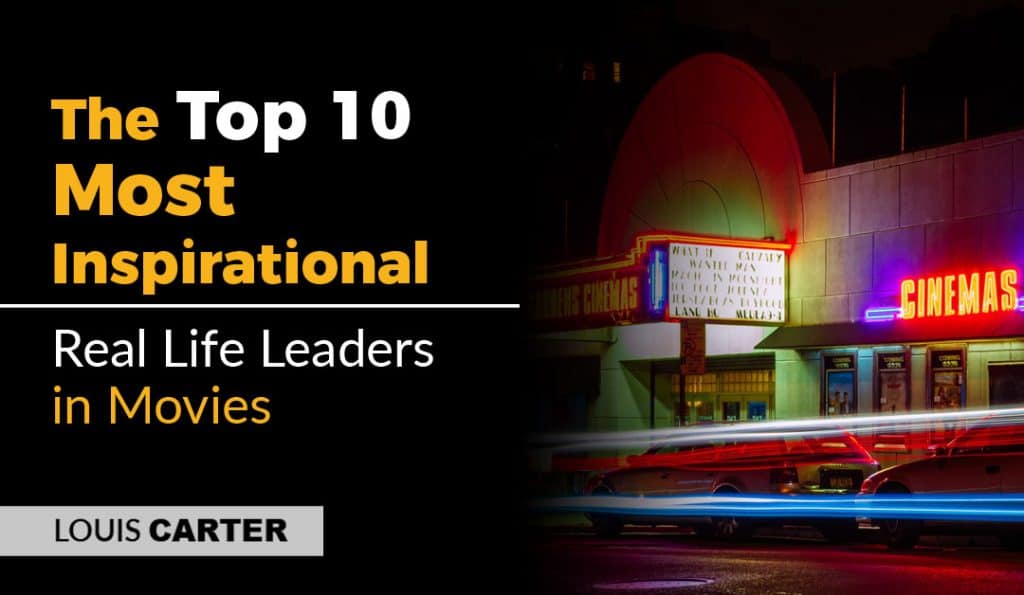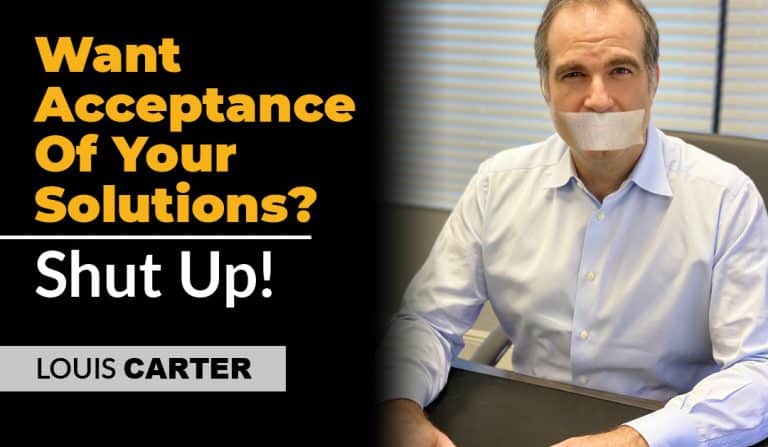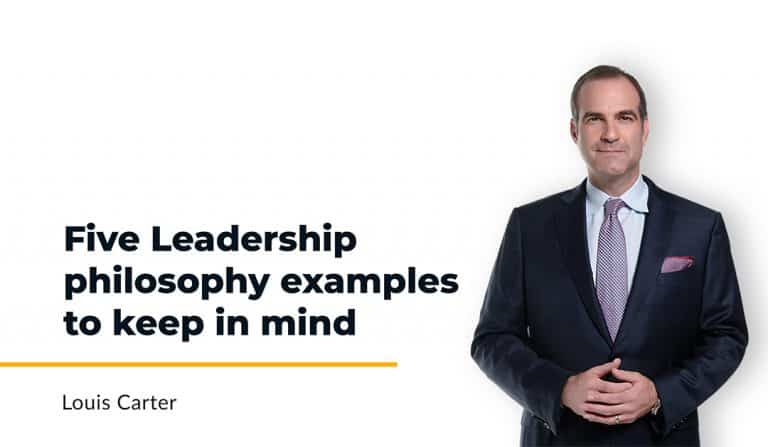Inspiration is all around us if we look close enough. Inspiration comes in many forms – from first responders to the people who help us daily. In this article, though, we look deeper at the leaders who help inspire our most noble actions – and have made a lasting impact on the field of leadership forever. These leaders have become ubiquitous in our global culture, mainly because of the power of film. Millions have viewed the following films in multiple languages across the world. The inspirational leaders take on various leadership styles. They mix many of these styles because, at the core of each of these inspirational leaders is a cocktail mix of the strength of mind, heart, discipline, humility, and empathy. None of these great world leaders would have the popularity and love of so many without their most human qualities. We are inspired because we see the same possibility of taking these noble and courageous actions ourselves. We are also motivated when we know what we would like to become. So many of the following leaders exemplify our most significant virtues – that live within all of us.
King George VI in The King’s Speech (2010)
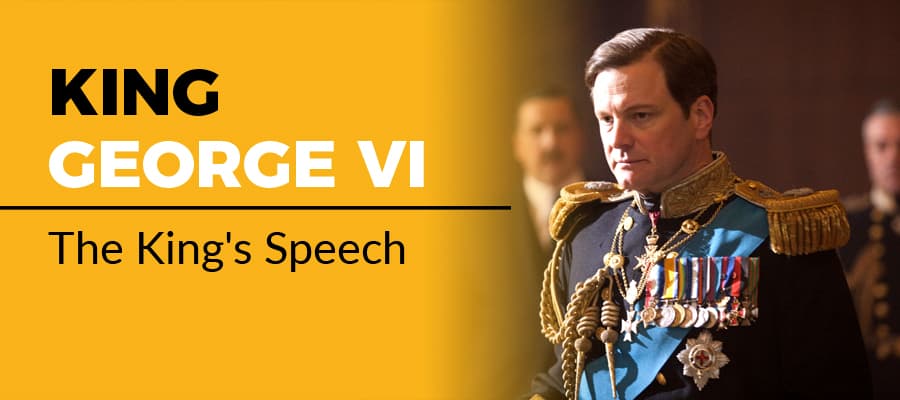
Participative Leadership and Transformational Leadership
King George VI ( born Prince Albert Frederick Arthur George) was born in Norfork, England, in 1895. Played by Colin Firth, King George VI first needs to overcome many obstacles before becoming King, notably a speech disorder. He seeks out help to fix his speech impediment so that he can deliver public speeches. He would stutter when expressing certain words and often prolonged certain sounds – something he had little control over. With the help of an Australian speech therapist, he worked on his weaknesses and eventually proved himself to be a charismatic and wise leader. He works with a coach and spends his time visualizing his public speaking performances. He possesses at least two vital inspirational leadership qualities: humility to seek out expert help and to maintain a vision that he is determined to fulfill.
The Crown, Queen Elizabeth II (2016 – present)
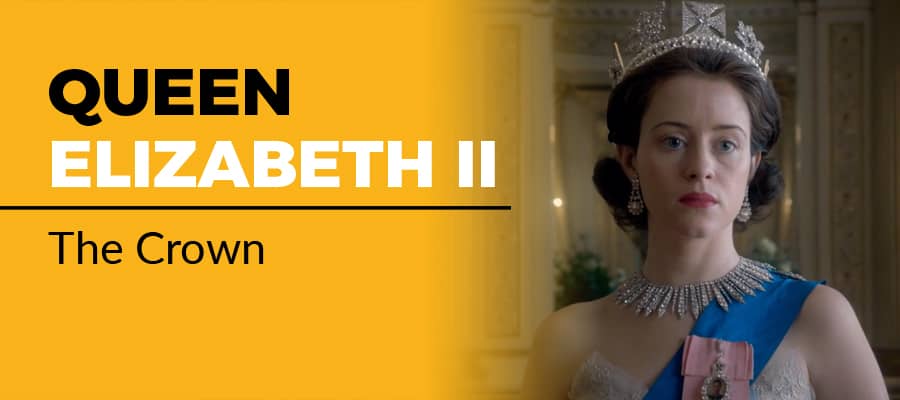
Humility, Self-awareness, Focus and strength, Charismatic Leadership
Queen Elizabeth II was born in Mayfair, London, in 1926, daughter of King George VI and Queen Elizabeth. Queen Elizabeth II (The Crown) would often use a slower, more gentle way of encouraging protocols to influence and produce positive systemic structural changes that would serve the people on a more individual level. Her form of encouragement may be denoted as ‘Pascals wager’ when explaining her viewpoint with prime ministers – she would state their position as “that’s right” and then give her perspective. An effective way of forming healthy debates and driving things forward as a leader, she wasn’t quick to assert her royal powers. Instead, she used advanced communication and thinking styles to help create a more balanced discussion and accelerate decision-making processes. People appreciate good ideas when they think it was them that thought of the idea first. Part of her influence and inspirational leadership is how she led people to discover her ideas as their own.
Katherine Goble, Hidden Figures (2016)
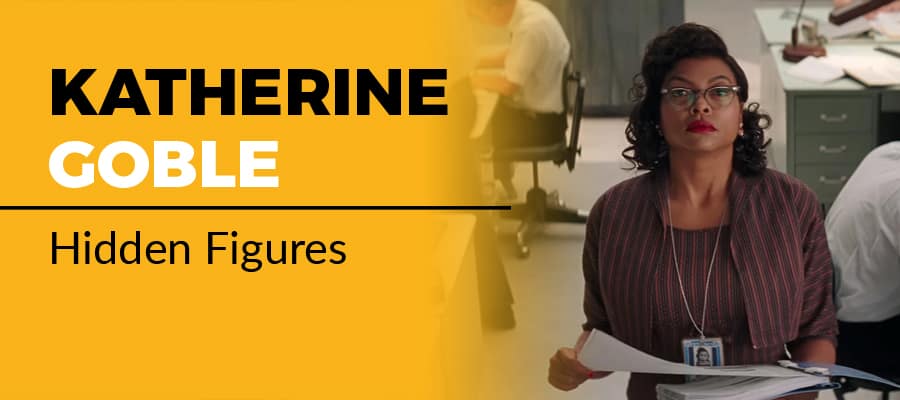
Transformational Leadership and Charismatic Leadership
Hidden Figures tells the true story of the Black women mathematicians who worked at NASA in the 1960s, focusing on Katherine Goble, the woman who eventually helped calculate trajectories for the Apollo 11 mission to the moon. Speaking up in the face of evil and injustice is an important quality and consistent behavior of inspirational leaders. In one scene, Al Harrison, played by Kevin Costner, smashes down a sign for a toilet blatantly displaying systemic segregation, a bathroom reserved for women of color. After smashing it down with a crowbar, he states, “here at NASA, we all pee the same color!”.
The film highlights how women faced racism and sexism daily inside of their predominantly white, seemingly unscientific political structure as they worked harder than their differently colored human counterparts, having to prove themselves more so than those around them. Katherine was an inspirational leader who exemplified how hard work, development of skills, and focused drive beats hatred.
Ragnar Lodbrok, Vikings (2013 – present)
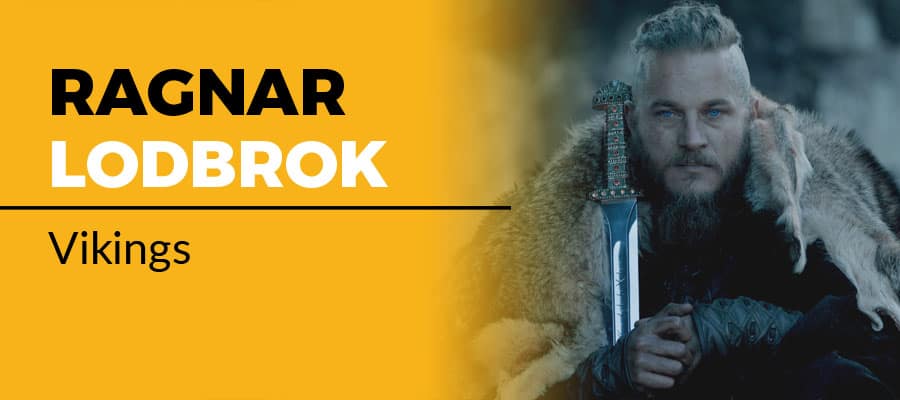
Autocratic Leadership and Charismatic Leadership
Ragnar Lodbrok was a King and War leader from the Viking age, seen through ancient Norse poetry. Lodbrok is known for his strength and ability to strategize. One of the defining traits of inspirational leaders is that they follow their intuition. They listen to their gut and let it guide their decisions and vision. They allow thoughts and ideas to process before making important decisions.
Another critical quality is that Ragar Lodbrok is known for is defying odds and doing what others say cannot be done. Lodbrok’s story encompasses his journey to power. He takes his armies to parts of the world that were unknown to his community – proving to them the west exists.
Another example of influential leaders is his degree of self-restraint and remaining strategic in the face of horrors. One of his enemies pillaged his hometown. He has an option of inflicting an act of swift revenge. Instead, he bided his time, pretended to maintain an alliance with his enemy agreeing to invade another neighboring territory with them. As a result of his timing, he leads the man and his army into an opposition and captures him.
William Wallace, Braveheart (1995)
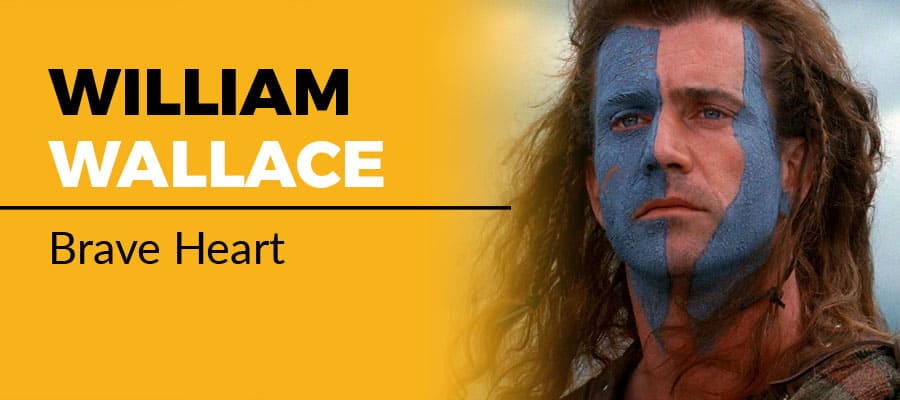
Autocratic Leadership and Charismatic Leadership
Braveheart, based on William Wallace, a late-13th-century Scottish warrior – played by Mel Gibson, is filled with quotes that apply to us even now, “Every man dies. Not every man lives.” – William Wallace. How often do we live someone else’s life, live only in a way expected of us, the courses of life that are influenced heavily by fears? We are inspired when leaders choose bravery. We can choose to be brave. Is bravery a prerequisite for authentic leadership? Everyone feels fear, but it’s the choice to move into the fear that creates inspirational leaders. Doing what is hard for the greater good and the betterment of loved ones manifests admirable leaders. We can all be leaders, we all bleed the same blood, and we all inevitably die. It is our choice to sing our own song and follow our hearts.
Robert Kearns, Flash of Genius (2008)
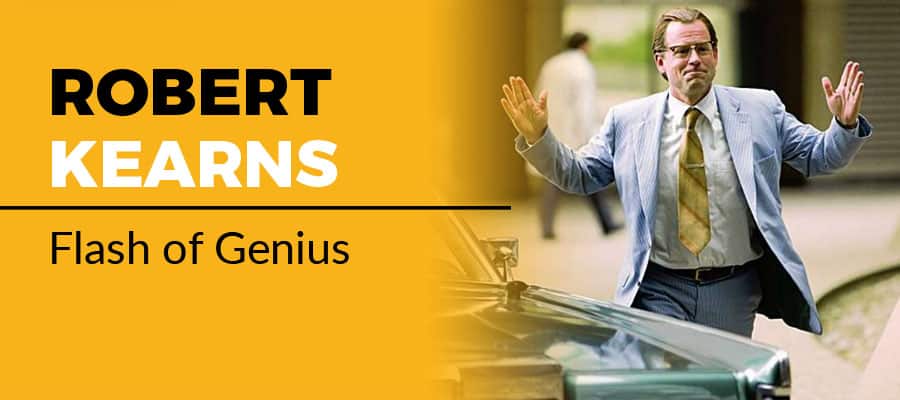
Democratic Leadership and Facilitative Leadership
‘Flash of Genius’ is the story of a part-time inventor and college professor Robert Kearns who works with lawyer Gregory Lawson to seek compensation after inventing the intermittent windscreen wiper. Initially, Ford Motors took all credit for his genius.
In a famous scene, Robert Kearns asks Gregory Lawson, “Whatever happened to this little thing called justice we talked about?” Lawson replies, “This is justice, Bob. This is how justice is dispensed in this country – with checkbooks. There are no brass bands, you know, there are no ticker-tape parades, the mayor doesn’t give you the key to the city and call you a hero. You get a check, and that check makes the lives of you and your family a little easier… a little more pleasant. It’s that simple.”
Often leaders are free thinkers who don’t need recognition from the outside world to know what they are doing is indeed meaningful. Many inspirational leaders do what is right for their families. Sometimes they tolerate the unfairness around them all to support and build better lives for their families; other times, they fight for what is right and give others hope. Arguably Robert Kearns was an inspirational leader who fights for both his family and all entrepreneurs.
Principal Joe Clary, Lean on Me (1989)
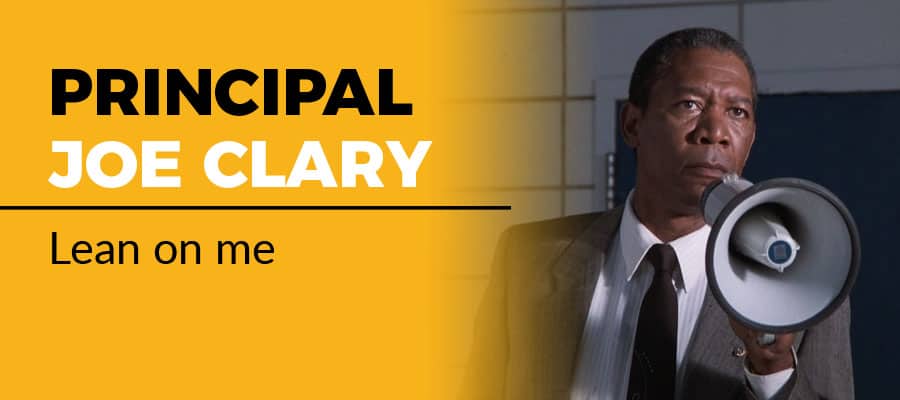
Charismatic Leadership and Transformational Leadership
Set in New Jersey, in a rough area where the school and students are underachieving, the school is at risk of being taken over by the state government if their grades do not improve. Principal Joe Clark, played by Morgan Freeman, is determined to lift his students and ingrain stronger students’ values so that they don’t go down the path of selling drugs and putting their lives at risk. In one speech, after they hear the news of a youth’s passing, he proceeds, “Next time, it may be you. If you do no better than they did, next time it WILL be you. They said this school was dead, like the cemetery it’s built on. But we call our Eastside teams “Ghosts”, don’t we? And what are ghosts? Ghosts are spirits that rise from the dead. I want you to be my ghosts. You will lead our resurrection by defying the expectation that all of us are doomed to failure. My motto is simple: If you fail in life, I don’t want you to blame your parents. I don’t want you to blame the White Man. I want you to blame yourselves. The responsibility is yours! In two weeks we have a practice exam.”
Being an inspirational leader is about taking responsibility for almost everything that happens. If you leave things to chance or find comfort in blaming the outside world for where you are in life, it expends energy that doesn’t serve you, and ultimately, the world will not bend for you. In business, the truly exceptional CEOs never blamed their company’s lack of success on their team – they take full responsibility. After all, they usually control who does what and when. It is rare for inspirational leaders to go through life, seeing themselves as victims. We seldom hear strong leaders complain. They are focused on the things that are going well and doing more of it. When the see opportunities for improvement, they change it to become better. Inspirational leaders know it’s better to suffer the pain of discipline that suffer the pain of failure. If you fail to prepare, prepare to fail.
Oskar Schindler, Schindler’s List, (1993)
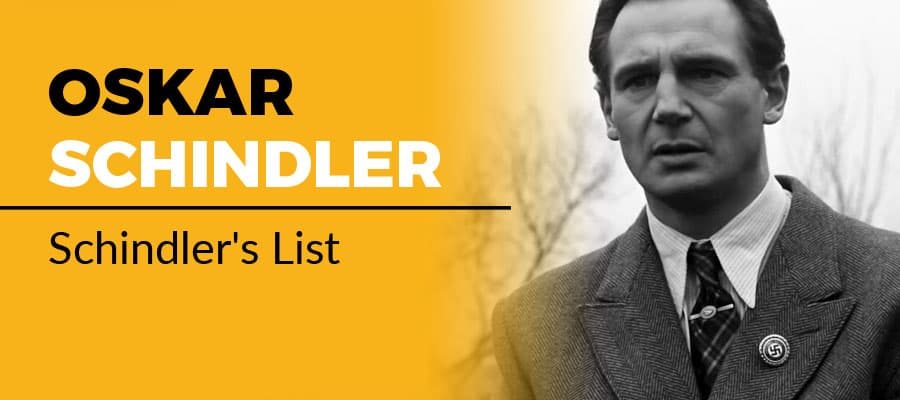
Autocratic Leadership and Transformational Leadership
Oskar Schindler was a German who owned and operated a factory in Krakow, Poland, a location very close to Auschwitz, the largest Nazi death camp. Fortunately, the better side of humanity shone through Oskar. Inspirational leaders are more often aware of when people function as automatons, influenced by groupthink, using social pressure as their moral compass. Taking action from groupthink is no way to live and is not a measure of ethical integrity. Instead of being an authoritative automaton taking the socially accepted route of exploiting his factory workers. He formed meaningful connections with Jewish laborers and ultimately saved thousands of lives by doing what is right, not of him.
Christopher Gardner, The Pursuit of Happyness (2006)
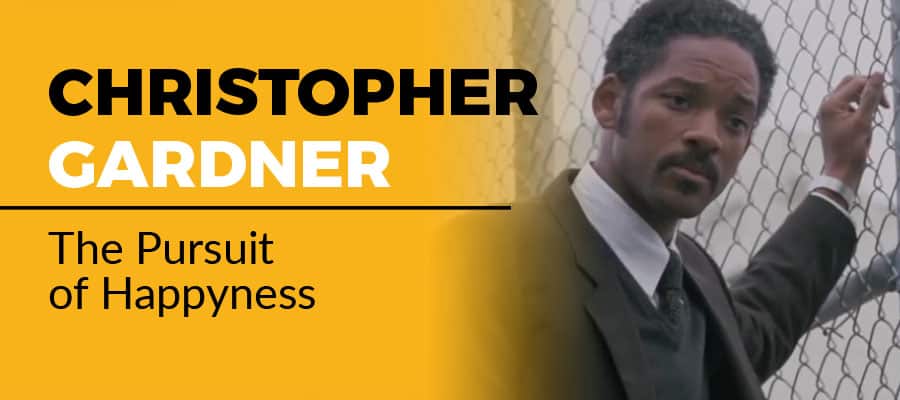
Charismatic Leadership and Strategic Leadership
In a conversation between Christopher Gardner (played by Will Smith), and his son, they have an emotional and vital conversation. He says to his son, “don’t ever let somebody tell you… You can’t do something. Not even me. All right?” he then goes onto say, “You got a dream… You have to protect it. People can’t do somethin’ themselves; they wanna tell you you can’t do it. If you want somethin’, get it. Period.”
Will Smith’s character acknowledges that implicit biases and protective instincts might not be in the best interests of his son’s dreams as a parent.
Limiting beliefs prevent us from going from what it is we truly desire. Self-doubts can be a natural part of our thinking at times; generally, it is unhelpful. If it isn’t our voice telling us it will be challenging to succeed, it will inevitably come from the people around us. ‘Most businesses fail,’ sure this is probably true, however. The average millionaire fails with three businesses before hitting their home run, bringing them a degree of financial prosperity.
Make decisions that you believe are necessary for you to win. Out of their insecurity, people will project their weaknesses onto the people around them, on some level, have significant limitations around their sense of self-belief. When they are saying, you can’t do something. It often a reflection of what they view is possible for themselves. Inspirational leaders don’t look around for people to tell them they can win. They commit to their vision and work with laser-like focus.
Voices from all different places tell people that they can’t succeed inevitable noise, unnecessary noise that is a part of every hero’s journey.
Coach Ken Carter, Coach Carter (2005)
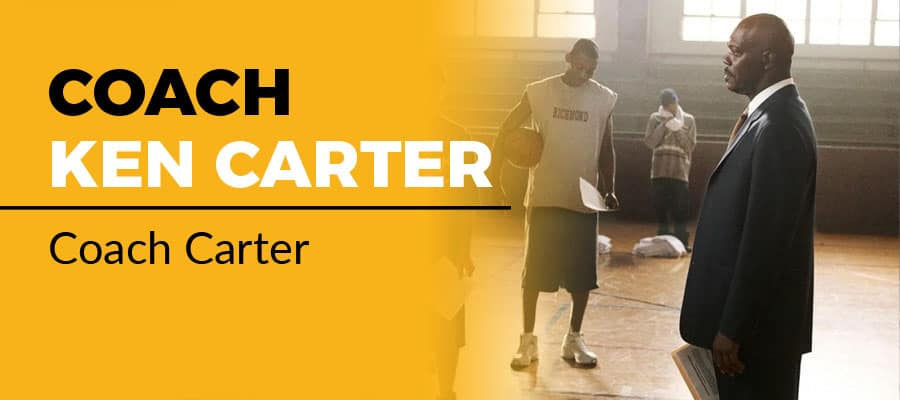
Transformational Leadership and Autocratic Leadership
Set in Richmond, California, a notably rough part of town, Coach Ken Carter played by Samuel L. Jackson, decides to create a contract amongst his players to ensure that their basketball, academic performance, and personal standards improve. Part of leadership is making hard choices, doing what’s right despite the pressures around us. After too many players breaking his contract, Carter decides to close the gym. It is an unpopular decision. However, he decides so that his pupils can focus and have bigger wins beyond just basketball, to prosper, and to get away from the streets.
In another scene, Timo Cruz says to his teammates, “Our deepest fear is not that we are inadequate. Our deepest fear is that we are powerful beyond measure. It is our light, not our darkness that most frightens us. Your playing small does not serve the world.“
Inspirational leaders see more in the people around them. They can draw out the best from the people around them, ultimately driving as many people in their presence and on their team forward.


